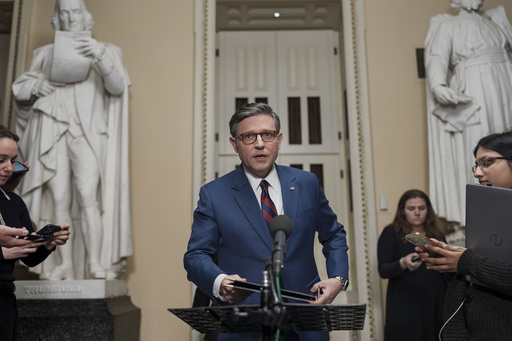As the clock ticked down to a potential midnight government shutdown, the House of Representatives passed a new fiscal strategy proposed by Speaker Mike Johnson designed to ensure temporary funding for federal operations and disaster aid. This plan notably excluded President-elect Donald Trump’s insistence for a debt ceiling hike extending into the new year.
The decision emerged just a day after a Trump-supported funding provision was dismissed, as both Democrats and a significant number of Republicans declined to back his last-minute requests. In a statement about the impending vote, Senate Majority Leader Chuck Schumer conveyed confidence that the Senate would advance the short-term spending measure in time to avert disruptions. Schumer expressed optimism, stating, “I have very good news for my colleagues and for the country,” indicating a series of votes could be conducted before the midnight deadline.
Although the legislation may not reach President Joe Biden’s desk before the deadline arrives, experts indicated it was unlikely to disrupt government operations significantly. Most federal workers, who were already off for the weekend, would not face furloughs, and historic data from the Committee for a Responsible Federal Budget shows that 10 funding gaps since 1981 — most occurring over weekends — had minimal effects.
In a recent late-night Senate move, a bipartisan initiative aimed at pediatric cancer research was saved, following cuts to an earlier proposal tied to the funding deal. Senator Tim Kaine successfully pushed the bill to a unanimous consent vote, allowing extensions on vital NIH programs despite the ongoing funding debates. While some Republicans and influential figures like Elon Musk celebrated the House’s trimmed legislation as a win, Democrats criticized the cuts to vital research funding.
With a final Senate vote on Social Security legislation anticipated, lawmakers sought to address longstanding payment disparities affecting nearly three million individuals receiving pensions as a result of government service. This bipartisan bill seeks to correct the historical inequities that have persisted, a significant focus for supporters during this session. As the Senate gears up for these votes, the broader implications for federal workers during the holiday season remain a concern, as feelings of uncertainty linger due to the funding negotiations.
Speaker Johnson recounted discussions with Trump and Musk, affirming that the former president understood the direction they were taking. Johnson later jokingly remarked on Musk’s contemplations regarding the speaker role, highlighting the complexities of governing in a politically charged environment. House Minority Leader Hakeem Jeffries framed the journey toward passing the funding legislation as a triumph for the American people and a preventative measure against the shutdown encouraged by the far-right members of the House.
As proceedings unfolded, the House’s legislative efforts navigated through swift transitions, with the Senate set to act rapidly on the passed bill. The House’s recent 366-34 approval reflects a bipartisan approach aimed at maintaining funding levels and granting disaster relief amid mounting pressures.
The backdrop of these discussions is marred by the influence of figures like Musk, whose social media rhetoric contributed to the unraveling of prior funding agreements. Many observers, including political science experts, highlight the shifting dynamics of power between Trump and Musk within this context. As a government shutdown looms, the stakes rise for Republicans, prompting cautious optimism that a solution can be reached before departure for the holiday break, as lawmakers prepare for yet another budgetary battle in just a few months.
Furthermore, criticisms aimed at Speaker Johnson emerge in light of his reliance on bipartisan compromise, with some party members expressing hesitations regarding his leadership. In the current political landscape, Trump’s position remains critical in gauging support for Johnson’s continued speakership at the onset of the new legislative session. As negotiations proceed, House Republicans convened discussions to explore new opportunities for funding while avoiding governmental closure, underscoring the pressure to align party interests and public service obligations.
Meanwhile, Vice President Kamala Harris postponed travel plans to focus on the government’s fiscal crisis as pivotal negotiations take place. Amidst swirling discontent about potential shutdown ramifications, Democratic leaders continue to encourage Johnson to revisit previous agreements made with them, advocating for swift resolution to ensure uninterrupted federal operations. As this tense atmosphere unfolds, the government finds itself at a crossroads; the implications could resonate significantly as local and national economies hover around the prospect of a government shutdown, further complicating the holiday spirit for many federal employees.


